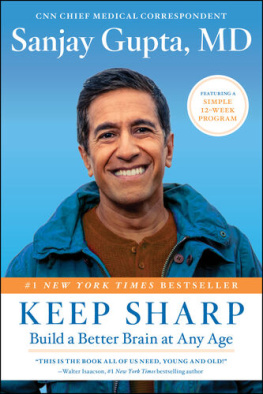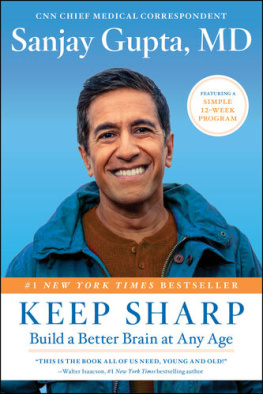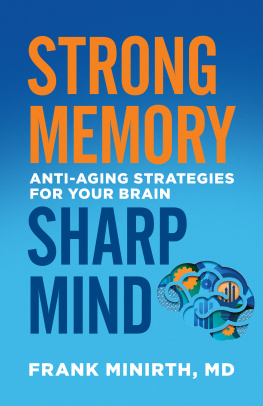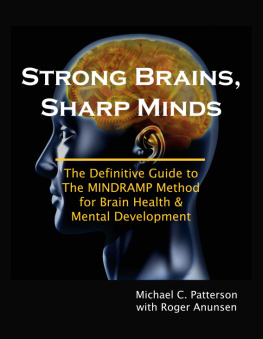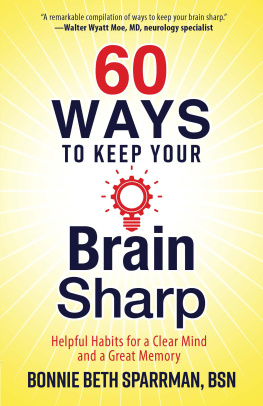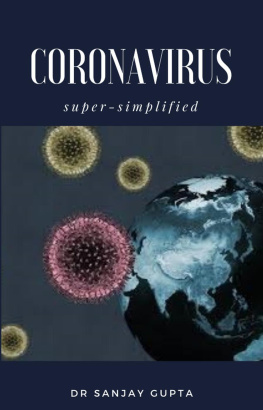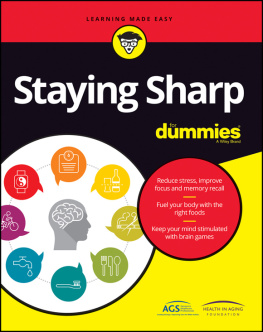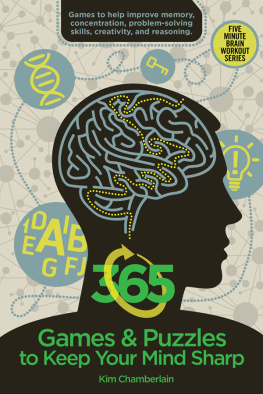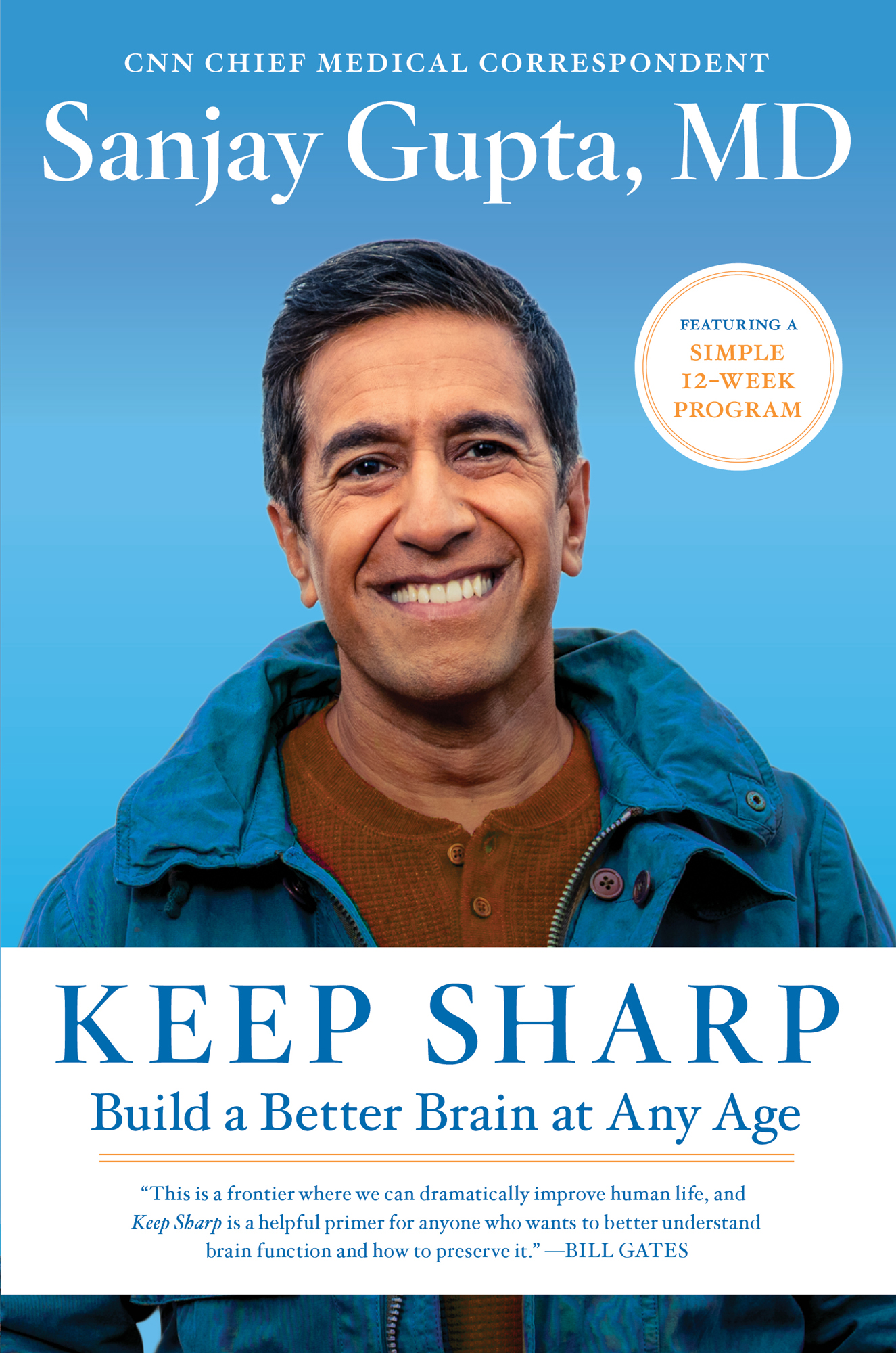Thank you for downloading this Simon & Schuster ebook.
Get a FREE ebook when you join our mailing list. Plus, get updates on new releases, deals, recommended reads, and more from Simon & Schuster. Click below to sign up and see terms and conditions.
CLICK HERE TO SIGN UP
Already a subscriber? Provide your email again so we can register this ebook and send you more of what you like to read. You will continue to receive exclusive offers in your inbox.
BUILD A BETTER BRAIN AT ANY AGE
For my three girls, Sage, Sky, and Soleil. In order of age, so as to preempt any future disputes over the dedication order. I love you so much, and watched you grow faster than this book. Always take the time to be completely present, because it is perhaps the best and most joyous way to keep your mind sharp and your life bright. You are still so young, yet you have given me a lifetime of memories I hope to never forget.
For my Rebecca, who has never wavered in enthusiasm. If in the end, our lives are just a collection of memories, mine will be filled of images of your beautiful smile and your steadfast support.
For anybody who has dreamed that their brain can be better. Not just free of disease or trauma, but optimized in a way that allows you to best build and remember your life narrative, and equips you to be resilient through lifes challenges. For anyone who has always believed their brain wasnt a black box, impenetrable and untouchable, but could be nourished and grown into something greater than they imagined.
Remembrance of things past is not necessarily the remembrance of things as they were.
Marcel Proust
INTRODUCTION Nothing Brainy about It
The brain is wider than the sky [and] deeper than the sea.
EMILY DICKINSON
Unlike most of my colleagues, I didnt grow up with a deep-seated desire to be a doctor, let alone a brain surgeon. My earliest aspiration was to be a writer, likely triggered by a boyhood crush I had on a grade school English teacher. When I chose medicine, I was thirteen years old and my grandfather had just suffered a stroke. We were very close, and witnessing his brain function change so quickly was jarring. He was suddenly unable to speak or write but seemed to understand what people said and could read without difficulty. Simply put, he could receive verbal and written communication easily, but he could not respond in those same ways. It was the first time I became fascinated by the intricate and mysterious functioning of the brain. I spent a lot of time at the hospital and was that annoying kid who asked the doctors a lot of questions. I felt very grown up as they patiently explained what had happened. I watched as those doctors were able to return my grandfather to good health after opening up his carotid artery to restore the blood flow to his brain and prevent future strokes. Having never spent much time with surgeons before then, I was hooked. I started reading everything I could about medicine and the human body. Before long, I was fixated on the brain, and specifically memory. It still astonishes me that our memoriesthe very fabric of who we arecan be reduced to invisible neurochemical signals between tiny areas of the brain. For me, those early explorations into the world of brain biology were at once demystifying and magical.
Years later, when I was in medical school in the early 1990s, conventional wisdom was that brain cells, such as neurons, were incapable of regenerating. We were born with a fixed set and that was it; throughout life, wed slowly drain the cache (and accelerate that killing off with bad habits like drinking too much alcohol and smoking marijuanathe truth about that later). Perhaps it was the eternal optimist in me, but I never believed that our brain cells simply stopped growing and regenerating. After all, we continue to have novel thoughts, deep experiences, vivid memories, and new learning throughout our lives. It seemed to me that the brain wouldnt just wither away unless it was no longer being used. By the time I finished my neurosurgery training in 2000, there was plenty of evidence that we could nurture the birth of new brain cells (called neurogenesis) and even increase the size of our brains. It was a staggeringly optimistic change in how we view the master control system of our bodies. Indeed, every day of your life, you can make your brain better, faster, fitter, and, yes, sharper. I am convinced of that. (Ill get to the bad habits later; they dont necessarily kill brain cells, but when they are abused, they can alter the brain, especially its memory powers.)
Let me say at the outset: I am certainly a fan of excellent education, but this is not what Keep Sharp is all about. This book is less about improving intelligence or IQ and more about both propagating new brain cells and making the ones you have work more efficiently. This isnt so much about remembering a list of items, performing well on exams, or executing tasks adeptly (though all of those goals will be more achievable with a better brain). In Keep Sharp, you will learn to build a brain that connects patterns others might miss and helps you better navigate life. You will develop a brain able to toggle back and forth between short-term and long-term views of the world and, perhaps most important, a brain highly resilient in the face of life experiences that might be disabling to someone else. In this book, I will precisely define resilience and teach you how to nurture it. Resilience has been a critical ingredient for my own personal growth.
Context matters when talking about something as important as the function or dysfunction of our brains, and our view of cognitive decline has changed dramatically over time. The history of documenting dementia dates back to at least 1550 BCE, when Egyptian doctors first described the disorder in whats known as the Ebers Papyrus, a 110-page scroll or manuscript that contains a record of ancient Egyptian medicine. But it was not until 1797 that the phenomenon was given a name, dementia, which literally means out of ones mind in Latin. The term was coined by a French psychiatrist, Philippe Pinel, who is revered as the father of modern psychiatry for his efforts to push for a more humane approach to the care of psychiatric patients. When the word was first used, however, dementia referred to people with an intellectual deficit (abolition of thinking) at any age. It was not until the end of the nineteenth century that the word was confined to people with a specific loss of cognitive ability. During that century, the British physician Dr. James Cowles Prichard also introduced the term senile dementia in his book, A Treatise on Insanity. The word senile, which means old, referred to any type of insanity that occurs in old people. Because memory loss is one of the most prominent symptoms of dementia, the word became mostly associated with old age.
For a long time, the elderly with dementia were believed to be cursed, or to have an infection like syphilis (because the symptoms of syphilis can be similar). So the word dementia was considered pejorative, used as an insult. In fact, when I first told my kids I was writing this book, they asked if it was about dementors, the dark, soul-sucking creatures from Harry Potter. The idea that dementia, which is not a specific disease but a group of symptoms associated with memory loss and poor judgment, is sometimes thought of in such negative ways is worth addressing briefly here.


